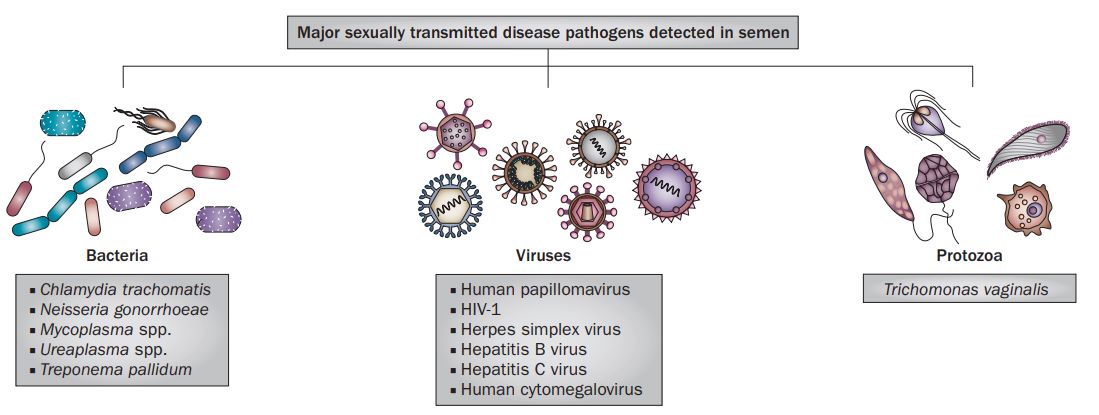Sexually transmitted infections (STIs) exert a critical influence on sexual health worldwide. Many different pathogens, including parasites, viruses and bacteria, can be spread in a variety of ways, including vaginal, anal, and oral sex. Additionally, some STIs can also be propagated from mother to child during pregnancy childbirth as well as breastfeeding. Multiple pathogenic bacteria are closely relevant to the high incidence of STIs, and these pathogens can be divided into two groups, curable infections such as syphilis and trichomoniasis and incurable infections such as hepatitis B and human immunodeficiency virus (HIV). It is worth noting that the majority of STIs have no symptoms, which may depend on the site of infection and the responsible pathogen. Multiple factors contribute to the continued evolvement of STIs, such as the probability of transmission and the rate of change of sexual partners.
 Fig.1 Summary about the major bacteria species that cause STDs.1
Fig.1 Summary about the major bacteria species that cause STDs.1
Adverse Consequences
Apart from the immediate effects of the infection itself, STIs can have severe effects. Some STIs, such as herpes and syphilis, increase the risk of HIV infection. Although most STIs are usually not life-threatening, they cause a significant burden of disease. STIs during pregnancy may cause fetal death, premature delivery, neonatal encephalitis, eye infection, and pneumonia. Furthermore, complications of curable STIs include ectopic pregnancy, infertility, chronic pelvic pain and cardiovascular disease.
Common Pathogens
-
Chlamydia trachomatis (C. trachomatis)
C. trachomatis infection is the most prevalent bacterial STI, which can be spread through sexual intercourse. It can also be passed to the baby during delivery. In general, it does not result in any symptoms. However, if left untreated, it can lead to other complications. Moreover, it may be accompanied by symptoms such as changes in vaginal discharge and burning pain when urinating. Additionally, C. trachomatis is also increasingly believed to be closely linked with prostatitis.
-
Neisseria gonorrhoeae (N. gonorrhoeae)
N. gonorrhoeae is the bacterial pathogen that causes gonorrhea, which usually infects the cervix in women or the urethra in men, and is closely associated with cervicitis or urethritis. In some infected individuals, asymptomatic infection occurs with a minimal inflammatory response. What's more, studies have shown that it can adversely affect fertility. Infected males may present with genitourinary inflammation such as urethritis and orchitis.
-
Treponema pallidum (T. pallidum)
T. pallidum is the proximate cause of syphilis. It is a potentially serious infection, and early treatment can prevent permanent damage and long-term complications. It's worth noting that this bacterium can be spread at any time during the infection. Of course, syphilis can also be propagated to the baby during pregnancy. Syphilis is classified as a treatable disease, however, data have shown that syphilis is strongly linked to an increased risk of HIV infection.
-
HIV
HIV is defined as a virus that attacks the immune system. Once infected with HIV, the virus is present in the body fluids of an infected person, including blood, breast milk, semen, and rectal fluid. The virus can be spread in many ways, such as through sexual contact, sharing needles and childbirth. If the fluid gets into another person, that person can also get HIV. Evidence reveals that HIV-infected people are also at higher risk of contracting other transmissible infections.
-
Herpes simplex virus (HSV)
HSV is one of the most widespread viruses in the population, and it can affect multiple parts of the body, including the skin, cervix, and genitals. HSV includes two closely related viruses, HSV-1, which is related to oral and occasionally genital sores, and HSV-2, the most common cause of genital herpes. Importantly, HSV-1 and HSV-2 have been detected in semen, and they may affect male fertility. In addition, HSV can be passed from mother to child during pregnancy or childbirth.
If you are interested in our anti-STI antibody products, please feel free to contact us.
For more product details, please visit the link below:
- Anti-Zoonotic Disease Antibody Products
- Anti-Gut Microbiota Antibody Products
- Anti-Foodborne Pathogen Antibody Products
- Anti-Plant Pathogen Antibody Products
- Fermentation Related Antibody Products
- Sharifi-Rad, Javad, et al. "Bioactive compounds as potential agents for sexually transmitted diseases management: a review to explore molecular mechanisms of action." Frontiers in Pharmacology 12 (2021): 674682. Distributed under Open Access license CC By 4.0, without modification.